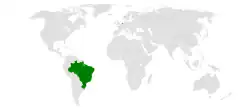Brazil—Netherlands relations
Brazil—Netherlands relations refers to the bilateral relationship between Brazil and the Netherlands. Brazil has an embassy in The Hague and a consulate in Amsterdam, and the Netherlands is represented by an embassy in Brasília and consulates in Belém, Belo Horizonte, Curitiba, Fortaleza, Manaus, Natal, Porto Alegre, Recife, Salvador, Rio de Janeiro, Santos, São Paulo and Vila Velha.[1][2]
 | |
Brazil |
Netherlands |
|---|---|
History
Brazil and the Netherlands share a historical and economic relationship that goes back to the 16th century, when the Dutch financed the establishment of the sugar industry in Northeast Brazil In exchange for their investments, the Dutch received the right to refine and distribute Brazilian sugar in Europe. They distributed it, mainly in France and England.
Dutch Brazil

The historical, cultural, and economic relationship between the two countries has as its initial milestone the Dutch occupation of the Brazilian Northeast in the 17th century[3] Once the conquered territory in the region was consolidated, Count Maurice of Nassau was appointed governor-general of Dutch Brazil by the Dutch West India Company. When Count Maurice of Nassau arrived in Brazil, he brought with him an entourage consisting of artists and scientists, which included the painters Frans Post and Albert Eckhout who first depicted the Brazilian landscape and its inhabitants and the physician and naturopath Willem Piso and botanist Georg Marggraf who described the flora, fauna and culture of Brazil in the scientific work Historia Naturalis Brasiliae.[4]
During the administration of Count Maurice of Nassau, bridges, dikes, a botanical garden, and the first astronomical observatory in the Americas were built in Recife.[5] The freedom of religion instituted by him in the colony also attracted Dutch Jews, who founded in the current city of Recife the first Jewish temple in the Americas, the Kahal Zur Israel Synagogue.[6]
Dutch immigration in Brazil
In the mid-1850s, a group of Dutch immigrants emigrated to Brazil and settled in the state of Espírito Santo, where they established the Holanda and Holandinha colonies.[7]
A group of Dutch immigrants settled in the Campos Gerais region of Paraná and founded the Carambeí Colony in early April 1911.[7] Because of the centennial of Dutch immigration in the Campos Gerais do Paraná, the Brazilian government instituted 2011 as the Year of the Netherlands in Brazil.[8]
In mid-1948, another group of Dutch immigrants settled in the interior of São Paulo, where they founded the Holambra colony, currently an emancipated municipality.[7]
Bilateral agreements
The diplomatic ties between the two countries date back to 1828, when the Empire of Brazil and the United Kingdom of the Netherlands signed a Treaty of Friendship, Navigation, and Commerce.[3]
In 1990, the governments of Brazil and the Netherlands signed a treaty to avoid double taxation in both countries.[9][10]
In 2011, Brazil and the Netherlands signed a military cooperation agreement, which includes joint military training in peace operations. The following year, the two countries signed an agreement related to logistics and on intermodal transport management.[11]
Economic relations
The Netherlands was from the beginning of the 2000s until the end of the 2010s the largest direct investor in Brazil.[12][13] In 2020, Brazil became the third largest exporter of goods to the Netherlands.[14]
The European country is the largest importer of soybeans in the European Union, and distributes two thirds to Germany, Belgium and Denmark.[15] The Netherlands imports 60% of Brazilian soybeans, which enter the country through the ports of Amsterdam and Rotterdam.[15]
References
- "Ambassades, consulaten en overige vertegenwoordigingen - Brazilië" (in Dutch). Rijksoverheid. 21 February 2018. Retrieved 2021-04-13.
- "Consulados - Holanda". Consulados.com.br. Retrieved 2021-04-13.
- "Reino dos Países Baixos". Ministério das Relações Exteriores. Archived from the original on 2021-04-19. Retrieved 2022-07-17.
- "Em Pernambuco, professor pesquisa estudos sobre plantas medicinais". redeglobo.globo.com (in Brazilian Portuguese). Retrieved 2022-07-17.
- "O Recife Holandês". www.ufrpe.br (in Brazilian Portuguese). Retrieved 2022-07-17.
- "Synagogue in Brazilian town Recife considered oldest in the Americas …". archive.ph. 2012-05-30. Archived from the original on 2012-05-30. Retrieved 2022-07-17.
{{cite web}}: CS1 maint: bot: original URL status unknown (link) - "Nederlandse groepsmigratie naar Brazilië 1822-1992" (PDF). Newhollandfoundation.nl. Retrieved 27 July 2022.
- "Câmara aprova 2011 como ano da Holanda no Brasil - Notícias". Portal da Câmara dos Deputados (in Brazilian Portuguese). Retrieved 2022-07-17.
- "Archived copy". Archived from the original on 2021-04-17. Retrieved 2022-07-17.
{{cite web}}: CS1 maint: archived copy as title (link) - Koninkrijksrelaties, Ministerie van Binnenlandse Zaken en. "Overeenkomst tussen het Koninkrijk der Nederlanden en de Federatieve Republiek Brazilië tot het vermijden van dubbele belasting en het voorkomen van het ontgaan van belasting met betrekking tot belastingen naar het inkomen". wetten.overheid.nl. Retrieved 2022-07-17.
- "Brasil e Holanda vão cooperar em Logística e Transportes". Ministério da Infraestrutura (in Brazilian Portuguese). Retrieved 2022-07-17.
- "Maioria dos investimentos no Brasil vem da Holanda". Folha de S.Paulo. 2003-01-05. Retrieved 2021-05-11.
- "Maioria dos investimentos no Brasil vem da Holanda". Exame. 2017-01-31. Retrieved 2021-05-11.
- "Holanda dobra compra de soja e vira terceiro destino de produtos do Brasil". Estadão. 2020-09-14. Retrieved 2022-05-11.
- "Greenpeace blokkeert sluis bij IJmuiden voor schip vol sojabonen uit Brazilië" (in Dutch). Het Parool. 2022-05-11. Retrieved 2022-05-11.
